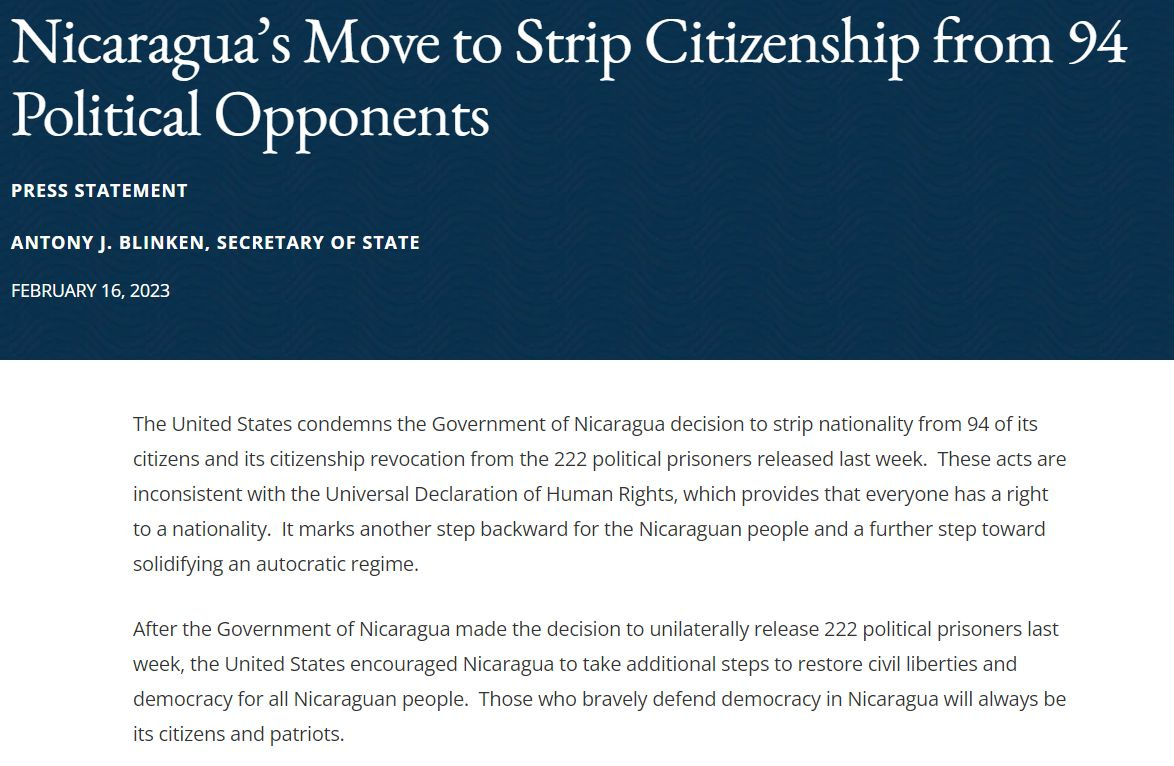What’s Being Left Out of the Conversation About Nicaragua
It’s a lot deeper than the Department of State and various political commentators make it out to be

I should start out by saying that I’m not in support of much of what I’m about to cover. I have no position on the elections and governance of other countries. I stand by the belief that every nation has a right to self-governance and self-determination. However, when I see statements from the Department of State regarding Latin America, I’m hesitant to believe them. They don’t exactly have the best record and what they often say could be regarded as propaganda.
I also have several Nicaraguan friends and I don’t think a single one of them supports Daniel Ortega’s government and I can understand why. But if we were to believe the picture painted by the State Department, Nicaragua is a full-blown dictatorship in the style former president Donald Trump could only dream of. Yet, it’s much deeper than any of the conversations being had about the 222 Nicaraguans freed from prison, sent to the US, and their citizenship revoked.
According to the Nicaraguan government, the 222 weren’t jailed for simply “demanding rights and speaking up against Ortega’s regime of horror,” as Erika Guevara Rosas, Americas director at Amnesty International said on Twitter. The administration alleges that they were incarcerated for attempting to lead a violent overthrow of the current regime in 2018.

The disconnects between narratives are as extreme as can be expected. And since we don’t typically access media outside the US regarding Latin America and the Caribbean, we rely solely on US media - which too often simply echoes the State Department’s narrative - without questioning it. This is obviously problematic for myriad reasons. But is it true?
Yes (sort of).
If I’ve learned anything from reporting on Cuba and Latin America, it’s that taking a step back before repeating what any government says and scrutinizing them is just the first step in finding the truth. Somewhere between both narratives lies the reality of what people are going through and Nicaragua isn’t any different. In other words, all governments, including ours (with the most powerful propaganda machine in the world), are manipulative in one way or another.
"These people committed crimes. They are not political prisoners,” head of the Research Group on Latin America at Middlesex University, Francisco Dominguez, told Kawsachun News. “Some of the crimes were very serious … if you were to be receiving money from a foreign country and organize a violent attempt to overthrow the existing government, you will be charged with sedition. And in the United States, this carries the death penalty or anything between that and 5 years in prison.”

The conflicting narratives are expansive. Including those within the US. Almost immediately after the Nicaraguan exiles arrived in the United States, Guevera-Rosas issued a statement. suggesting the prisoners released were forcibly expelled from the country for nothing more than demanding human rights.
“While we share our excitement at the fact that those removed to the United States are no longer behind bars in Nicaragua, we are shocked and saddened that their detention has culminated in such a disturbing fashion,” said Guevera-Ross. “Those detained spent days, months and years in arbitrary detention, under extreme conditions, and today have been forced into exile solely for demanding human rights.”
However, shortly after a Nicaragua judge declared that the 222 prisoners had been “deported” under an order issued the day before declaring them “traitors to the country,” a senior Biden administration official said those that left Nicaragua did so voluntarily. So which is it? It’s likely they left the country voluntarily. Especially if it was a condition of their release. Truth is, whether guilty of what the government is alleging or not, any one of us would have taken that offer.
Stripping 94 of those exiles of their citizenship is a bridge too far. They are now stateless and have been paroled in the United States for a period of two years for humanitarian reasons. The right to nationality and the ability to participate in that society is one of the most basic human rights. The idea that this is an acceptable form of punishment is alarming indeed and those that have spoken out against it are correct for doing so.
Even so, the language we use is important.

The suggestion that none of the 222 committed any crimes is absurd. Much like in Cuba, many people scream about political prisoners. Yet, oftentimes, some of the people mentioned have been jailed for sex crimes, assaults, and even the widespread destruction of property during the July 11, 2021 protests on the island. Similarly, when hate groups such as the Proud Boys refer to themselves as political prisoners for attacking the Capitol, we find it laughable because they led an attack against the nation and the current administration.
Considering that the United States has been trying to overthrow the Nicaraguan government and install a leader who is friendly to US corporate interests, there’s plenty of reason to doubt the narratives coming from the Department of State and its associated non-governmental organizations (NGOs). Additionally, the suggestion that the exiles were denied “due process” after being found guilty in Nicaraguan courts is also dubious.
Like Cuba, Ortega’s regime has much to be criticized for. But it’s a disservice to the people of Nicaragua to continue promoting lies and propaganda. The United States can not do anything beneficial for Latin America and the Caribbean by continuing to disinform and discredit itself in the eyes of citizens in the southern hemisphere. Policymakers surely see that.
If nothing changes, the propaganda wars will only continue.
Arturo is a writer, journalist, and publisher of The Antagonist Magazine and a regular contributor at Latino Rebels. You can find him on Twitter, Facebook, and Instagram.



Are there legitimate sources of news in Nicaragua?